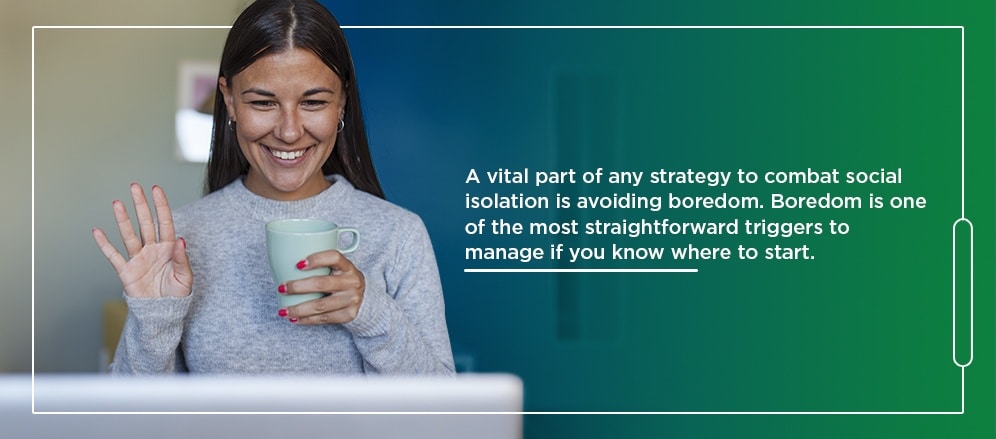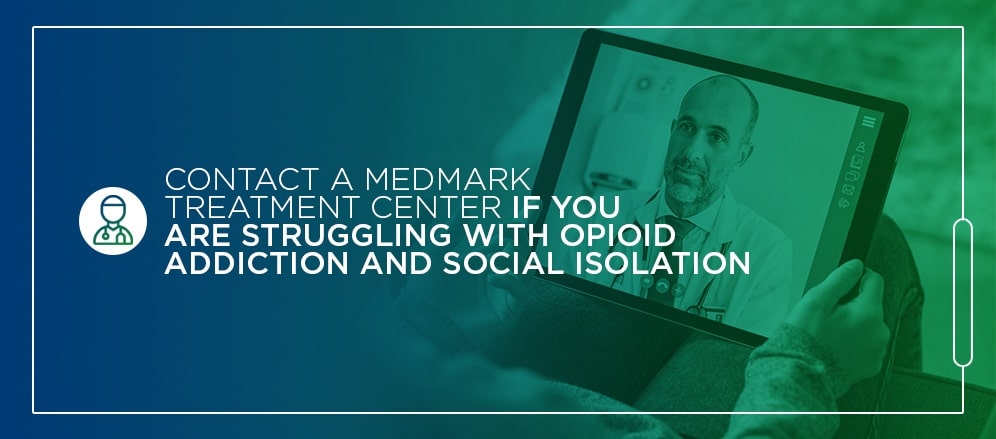Human beings are naturally social creatures. Social wellness is so essential that it’s one of the eight dimensions of wellness defined by the Substance Abuse and Mental Health Services Administration. Frequent socialization gives people a sense of comfort and can encourage a healthier way of life. Stable, supportive relationships can help you cope with negative thoughts or feelings you might otherwise handle in an unhealthy manner.
However, if you can’t achieve or maintain social wellness, it can have a devastating impact on your life. Being socially isolated can harm your physical and emotional health on multiple levels. Learning how social isolation can cause addiction is essential for anyone struggling with opioid abuse on their own.
Does Social Isolation Lead to an Increased Chance of Addiction?
When people are depressed, anxious or plagued by stress, they may turn to drugs to block or repress their feelings. It is often easier to block out reality than it is to cope. Socially isolated people have even less of a chance to work out their feelings with the help of others, so substance abuse quickly becomes a crutch they can’t get rid of alone.
What Is Social Isolation?
It’s critical to understand the significant difference between true social isolation and mere loneliness. To fit into the socially isolated category, someone must typically live alone, not participate in clubs or community activities and have little to no contact with friends and family.
On the other hand, loneliness occurs when someone feels disconnected from others, making them sad or anxious. Social isolation involves physical distance from others, while a lonely person can be in the presence of others while still feeling alone. Someone can be both socially isolated and lonely, as is frequently the case.
Loneliness caused by social isolation often comes with symptoms of depression and anxiety. When people spend most of their time alone, it’s easy for thoughts and emotions to become heavily distorted. People can develop opioid addiction during social isolation because there is nobody else around to see the effects of escalating drug abuse. There might not be anybody to notice that you have taken an extra painkiller tablet to feel intoxicated. There may be no one to ask why you haven’t been coming to meetings.
When others aren’t around to observe and ask questions, there is no pushback when you start taking more and more of an opioid. Isolation can speed the rate at which opioid addiction develops, and makes it more dangerous because nobody can call emergency services and administer naloxone if you end up overdosing.
Why Humans Need Social Interaction
The emotions accompanying social isolation and opioid addiction go hand in hand. When you are isolated, you will likely feel:
- Like you can’t connect with anyone on a physical or emotional level.
- Disconnected from humanity at large.
- Sad that you have no one to talk to who understands your situation.
- Abandoned by friends and family.
- Like no one wants to spend time with you.
- Discontent with your lot in life.
- Left out of activities you would like to participate in.
- Hopeless about your future.
- Like you will always feel this way.
These emotions are often overwhelming and are crucial in how isolation can contribute to an addiction. When more than one occurs at the same time, it’s natural to want them to go away. However, abusing an opioid to drown out feelings is a warning sign of addiction. How can you prevent yourself from allowing opioid addiction to develop in social isolation? Try these techniques.
- Keep a journal: Monitoring your emotions from day to day can help you spot unhealthy patterns. Are there certain days of the week or times of day when you feel especially stressed? If so, you can plan to expend extra time and energy managing those emotions.
- Identify other triggers: Stress isn’t the only thing that can make you want to abuse opioids. Other emotions like anger or even happiness can trigger the desire to use. For example, if you get a promotion or achieve something at work, you may feel tempted to “celebrate” by getting high.
- Learn to manage cravings: You can have cravings for opioids before being fully addicted, so it’s essential to learn how to manage a desire to abuse drugs. Counseling can provide you with successful strategies for resisting cravings.

How to Keep Busy During Social Isolation
A vital part of any strategy to combat social isolation is avoiding boredom. Boredom is one of the most straightforward triggers to manage if you know where to start. The best ways to keep busy involve connecting with others, but knowing how to occupy yourself when you’re alone is equally important. These are some simple ways to keep busy during social isolation:
- Have meaningful conversations with family and friends.
- Attend recovery meetings regularly.
- Take up mindfulness activities like meditation, prayer or yoga to help you explore the differences between being alone and being lonely.
- Sign up for classes that broaden your knowledge base and teach new skills.
- Take up artistic activities like art, dance or creative writing.
- Develop an at-home fitness routine to keep your body healthy, as well as your mind.
When you’re busy, there is less room for negative emotions to flow. Making plans and following through on them increases your sense of self-efficacy and reinforces your ability to stick with decisions you make, such as participating in an addiction treatment program.
How Clinics Are Addressing Social Isolation During Addiction Treatment
As more people are choosing to self-isolate, the standard model of medication-assisted treatment (MAT) is shifting. The traditional process of attending a methadone clinic each day to receive medication has evolved to allow people to take their medications at home. The Drug Enforcement Agency has approved an exception to the law that allows treatment center staff, law enforcement and National Guard personnel to allow methadone and other medications to be stored in an approved lockbox at a patient’s home, even if they have not met the standard criteria for earning take home medication.
Clinics are also changing the delivery of counseling services. Rather than meeting with counselors in person, many clinics have switched to virtual or telehealth services, allowing clients to meet with their counselors over the phone or through video chat. Many support groups have moved to online services, so people in recovery can continue receiving the social support they need while in social isolation.
Contact a MedMark Treatment Center If You Are Struggling With Opioid Addiction and Social Isolation
Can isolation cause an opioid addiction? Absolutely. Recovering from opioid addiction during social isolation is not without its challenges, but MedMark has committed to the goal of delivering the highest standard of MAT in these circumstances. MedMark has programs all across the United States, ready to help you or a loved one overcome addiction. Find a MedMark location near you and contact us to get your recovery started.


